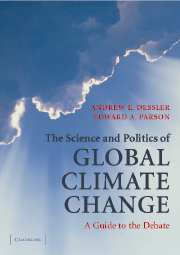Book contents
- Frontmatter
- Contents
- Preface
- 1 Global climate change: a new type of environmental problem
- 2 Science, politics, and science in politics
- 3 Climate change: present scientific knowledge and uncertainties
- 4 The climate-change policy debate: impacts and potential responses
- 5 The present impasse and steps forward
- Appendix
- Glossary
- References
- Index
- References
3 - Climate change: present scientific knowledge and uncertainties
- Frontmatter
- Contents
- Preface
- 1 Global climate change: a new type of environmental problem
- 2 Science, politics, and science in politics
- 3 Climate change: present scientific knowledge and uncertainties
- 4 The climate-change policy debate: impacts and potential responses
- 5 The present impasse and steps forward
- Appendix
- Glossary
- References
- Index
- References
Summary
This chapter summarizes what we know about climate change, and where the key uncertainties and gaps in our present knowledge lie. Contrary to the impression you might get from following the debate in the news, we actually know a great deal about the climate – about its present status, observed variation and trends, the extent of human influence on it, and potential future changes. We parse the questions of the reality and importance of climate change into four separate, specific questions.
Is the climate changing?
Are human activities responsible for the observed changes?
What are the likely climate changes over the next century or so?
What will the impacts of future climate changes be?
For each of these, we will review the available evidence and summarize the present scientific consensus, the degree of uncertainty, and the key remaining disagreements.
Is the climate changing?
To answer this question, we must first sharpen it in three ways. First, we must define what we mean by “climate.” Climate is not just temperature, but also includes such factors as humidity, precipitation, cloudiness, and winds, etc. Although changes in any of these quantities can matter, we focus on temperature because it is the climatic characteristic for which the best data are available and the one that should be most directly influenced by greenhouse-gas emissions. Second, we must specify the time period we will consider.
- Type
- Chapter
- Information
- The Science and Politics of Global Climate ChangeA Guide to the Debate, pp. 47 - 89Publisher: Cambridge University PressPrint publication year: 2005



